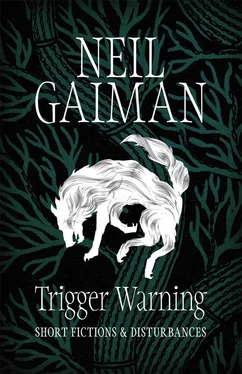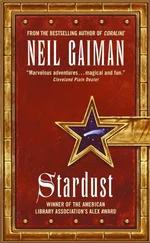Neil Gaiman - Trigger Warning - Short Fictions and Disturbances
Здесь есть возможность читать онлайн «Neil Gaiman - Trigger Warning - Short Fictions and Disturbances» весь текст электронной книги совершенно бесплатно (целиком полную версию без сокращений). В некоторых случаях можно слушать аудио, скачать через торрент в формате fb2 и присутствует краткое содержание. Год выпуска: 2015, Издательство: Headline, Жанр: Старинная литература, на английском языке. Описание произведения, (предисловие) а так же отзывы посетителей доступны на портале библиотеки ЛибКат.
- Название:Trigger Warning: Short Fictions and Disturbances
- Автор:
- Издательство:Headline
- Жанр:
- Год:2015
- ISBN:нет данных
- Рейтинг книги:4 / 5. Голосов: 1
-
Избранное:Добавить в избранное
- Отзывы:
-
Ваша оценка:
- 80
- 1
- 2
- 3
- 4
- 5
Trigger Warning: Short Fictions and Disturbances: краткое содержание, описание и аннотация
Предлагаем к чтению аннотацию, описание, краткое содержание или предисловие (зависит от того, что написал сам автор книги «Trigger Warning: Short Fictions and Disturbances»). Если вы не нашли необходимую информацию о книге — напишите в комментариях, мы постараемся отыскать её.
Trigger Warning: Short Fictions and Disturbances — читать онлайн бесплатно полную книгу (весь текст) целиком
Ниже представлен текст книги, разбитый по страницам. Система сохранения места последней прочитанной страницы, позволяет с удобством читать онлайн бесплатно книгу «Trigger Warning: Short Fictions and Disturbances», без необходимости каждый раз заново искать на чём Вы остановились. Поставьте закладку, и сможете в любой момент перейти на страницу, на которой закончили чтение.
Интервал:
Закладка:
And Minou would reply, ‘Ah yes. But the woman on the aisle, who looks like the German chancellor, she is now fighting to stay awake.’ If one person falls asleep, you can lose the whole audience, so we would play the rest of the evening to a middle-aged woman who wished only to succumb to drowsiness.
The second time you stood near me you were so close I could smell your shampoo. It smelled like flowers and fruit. I imagine America as being a whole continent full of women who smell of flowers and fruit. You were talking to a young man from the university. You were complaining about the difficulties of our language for an American. ‘I understand what gives a man or a woman gender,’ you were saying. ‘But what makes a chair masculine or a pigeon feminine? Why should a statue have a feminine ending?’
The young man, he laughed and pointed straight at me then. But truly, if you are walking through the square, you can tell nothing about me. The robes look like old marble, water-stained and timeworn and lichened. The skin could be granite. Until I move I am stone and old bronze, and I do not move if I do not want to. I simply stand.
Some people wait in the square for much too long, even in the rain, to see what I will do. They are uncomfortable not knowing, only happy once they have assured themselves that I am a natural, not an artificial. It is the uncertainty that traps people, like a mouse in a glue trap.
I am writing about myself perhaps too much. I know that this is a letter of introduction as much as it is a love letter. I should write about you. Your smile. Your eyes so green. (You do not know the true colour of my eyes. I will tell you. They are brown.) You like classical music, but you have also ABBA and Kid Loco on your iPod nano. You wear no perfume. Your underwear is, for the most part, faded and comfortable, although you have a single set of red-lace brassiere and panties which you wear for special occasions.
People watch me in the square, but the eye is only attracted by motion. I have perfected the tiny movement, so tiny that the passer can scarcely tell if it is something he saw or not. Yes? Too often people will not see what does not move. The eyes see it but do not see it, they discount it. I am human-shaped, but I am not human. So in order to make them see me, to make them look at me, to stop their eyes from sliding off me and paying me no attention, I am forced to make the tiniest motions, to draw their eyes to me. Then, and only then, do they see me. But they do not always know what they have seen.
I think of you as a code to be broken, or as a puzzle to be cracked. Or a jigsaw puzzle, to be put together. I walk through your life, and I stand motionless at the edge of my own. My gestures – statuesque, precise – are too often misinterpreted. I want you. I do not doubt this.
You have a younger sister. She has a MySpace account, and a Facebook account. We talk sometimes on messenger. All too often people assume that a medieval statue exists only in the fifteenth century. This is not so true: I have a room, I have a laptop. My computer is passworded. I practise safe computing. Your password is your first name. That is not safe. Anyone could read your email, look at your photographs, reconstruct your interests from your web history. Someone who was interested and who cared could spend endless hours building up a complex schematic of your life, matching the people in the photographs to the names in the emails, for example. It would not be hard reconstructing a life from a computer, or from cell phone messages. It would be like filling a crossword puzzle.
I remember when I actually admitted to myself that you had taken to watching me, and only me, on your way across the square. You paused. You admired me. You saw me move once, for a child, and you told a woman with you, loud enough to be heard, that I might be a real statue. I take it as the highest compliment. I have many different styles of movement, of course – I can move like clockwork, in a set of tiny jerks and stutters, I can move like a robot or an automaton. I can move like a statue coming to life after hundreds of years of being stone.
Within my hearing you have spoken many times of the beauty of this small city. How, for you, to be standing inside the stained-glass confection of the old church was like being imprisoned inside a kaleidoscope of jewels. It was like being in the heart of the sun. Also, you are concerned about your mother’s illness.
When you were an undergraduate you worked as a cook, and your fingertips are covered with the scar-marks of a thousand tiny knife-cuts.
I love you, and it is my love for you that drives me to know all about you. The more I know the closer I am to you. You were to come to my country with a young man, but he broke your heart, and still you came here to spite him, and still you smiled. I close my eyes and I can see you smiling. I close my eyes and I see you striding across the town square in a clatter of pigeons. The women of this country do not stride. They move diffidently, unless they are dancers. And when you sleep your eyelashes flutter. The way your cheek touches the pillow. The way you dream.
I dream of dragons. When I was a small child, at the home, they told me that there was a dragon beneath the old city. I pictured the dragon wreathing like black smoke beneath the buildings, inhabiting the cracks between the cellars, insubstantial and yet always present. That is how I think of the dragon, and how I think of the past, now. A black dragon made of smoke. When I perform I have been eaten by the dragon and have become part of the past. I am, truly, seven hundred years old. Kings come and kings go. Armies arrive and are absorbed or return home again, leaving only damaged buildings, widows and bastard children behind them, but the statues remain, and the dragon of smoke, and the past.
I say this, although the statue that I emulate is not from this town at all. It stands in front of a church in southern Italy, where it is believed to represent either the sister of John the Baptist, or a local lord who endowed the church to celebrate that he had not died of the plague, or the angel of death.
I had imagined you perfectly pure, my love, pure as I am, yet one time I found that the red lace panties were pushed to the bottom of your laundry hamper, and upon close examination I was able to assure myself that you had, unquestionably, been unchaste the previous evening. Only you know who with, for you did not talk of the incident in your letters home, or allude to it in your online journal.
A small girl looked up at me once, and turned to her mother, and said, ‘Why is she so unhappy?’ (I translate into English for you, obviously. The girl was referring to me as a statue and thus she used the feminine ending.)
‘Why do you believe her to be unhappy?’
‘Why else would people make themselves into statues?’
Her mother smiled. ‘Perhaps she is unhappy in love,’ she said.
I was not unhappy in love. I was prepared to wait until everything was right, something very different.
There is time. There is always time. It is the gift I took from being a statue – one of the gifts, I should say.
You have walked past me and looked at me and smiled, and you have walked past me and other times you barely noticed me as anything other than an object. Truly, it is remarkable how little regard you, or any human, gives to something that remains completely motionless. You have woken in the night, got up, walked to the little toilet, micturated, walked back to your bed, slept once more, peacefully. You would not notice something perfectly still, would you? Something in the shadows?
If I could I would have made the paper for this letter for you out of my body. I thought about mixing in with the ink my blood or spittle, but no. There is such a thing as overstatement, yet great loves demand grand gestures, yes? I am unused to grand gestures. I am more practised in the tiny gestures. I made a small boy scream once, simply by smiling at him when he had convinced himself that I was made of marble. It is the smallest of gestures that will never be forgotten.
Читать дальшеИнтервал:
Закладка:
Похожие книги на «Trigger Warning: Short Fictions and Disturbances»
Представляем Вашему вниманию похожие книги на «Trigger Warning: Short Fictions and Disturbances» списком для выбора. Мы отобрали схожую по названию и смыслу литературу в надежде предоставить читателям больше вариантов отыскать новые, интересные, ещё непрочитанные произведения.
Обсуждение, отзывы о книге «Trigger Warning: Short Fictions and Disturbances» и просто собственные мнения читателей. Оставьте ваши комментарии, напишите, что Вы думаете о произведении, его смысле или главных героях. Укажите что конкретно понравилось, а что нет, и почему Вы так считаете.







